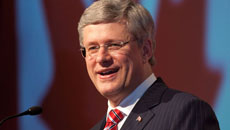You left the political arena in 2006, what have you been up to since this time?
I’ve remained engaged and involved within the community, participated in events and debates on radio and TV and written in various newspapers. I am writing an interesting book on my political experience and have been consulted for advice on a wide range of issues. I received a honourary Doctorate of Philosophy in Political Science and Diplomacy in 2012. I also
tried learning some French and spent quality time with my (now grown) children and my parents, which I
had been unable to do while in politics.
Why are you seeking nomination in Cloverdale-Langley City (formerly Surrey-Central)?
I was approached by a significant number of people and former colleagues to run again, and was the first candidate to announce my intention to run in this new riding. Cloverdale-Langley City’s Surrey area is from the former riding of Surrey-Central, which I had the privilege and honour to represent from 1997 to 2004 (prior to representing Newton-North Delta until 2006). I was a very accessible, helpful, and hardworking MP and with the experience I have gained since, I’ll even work more diligently. I enjoy being an MP; working for constituents is my passion and I again would be their strong voice in the Canadian parliament.
With your return, what kind of reaction are you hoping for from the community?
I am already getting an enthusiastic response and welcome. My old supporters have come out from the woodworks offering their commitment and help during the campaign. In fact, it is their encouragement that reinforced my decision to run again. They have expressed their confidence in my track record and believe that I have the ingredients for them to hire me to successfully represent them in the Canadian parliament. Many have come up to tell me that they missed me as their MP. I’m now back and will definitely strive to live up to their expectations and my reputation.
When you left politics, there were a few incidents that were under investigation. Can you please update our readers as to the outcomes?
As a MP, I am proud of my record, my political convictions and values. I was a strong team player and a contributing member to our caucus. As you may know, due to my whistleblowing against corruption in the previous government, I was the target of a political vendetta that launched politically motivated investigations. I was cleared from every single investigation as I had not done anything wrong. I chose to step aside while I was investigated. Now vindicated, I am resuming my efforts to serve my constituents, my party and my country.
What are your views on the Senate and a potential reform of this institution?
I’ve actually had rare opportunities to work with Senators. As Co-Chair of the Standing Joint Committee of the House and Senate on Scrutiny of Regulations for seven terms, I experienced the important role Senators play in the law making
process, but their work remain unappreciated since it is not often reported to the public and in the media. Many problems of Senate are not necessarily because of the institution, but because of the way it is admin-istered and accounted for. A reformed Senate would help to strengthen and sustain democracy in Canada.
What would you say were your greatest achievements when you served as MP?
My greatest accomplishment is that I served my constituents well. As Deputy House Leader, I helped move forward the Conservative agenda. I held many prominent positions in the Official Opposition as senior critic for Foreign Affairs, Multiculturalism, Canadians Abroad, Regulatory Reforms, Canadian International Development, Health and Environment.
I introduced 50 Bills and Motions, and many of them passed votes in the House. My Bill C-205 became law and closed the black hole of accountability in the Canadian regulatory process, and it was the only Private Members Bills of the Canadian Alliance that had Royal Assent. I also raised numerous issues including the recognition of international credentials, removing taxes on taxes, the head tax on immigrants, visitor visa bonds, the whistleblowers bill, the Air India inquiry, redress of the Komagata Maru tragedy, corruption in foreign missions and moving radioactive material from Surrey and many others.
You have a number of firsts to your credit?
I hold many records. I was the first Sikh and Indo-Canadian nominated in the Reform Party and elected to the Official Opposition of Canada. As Deputy House Leader, I was the first visible minority appointed as an Officer of the House. I was elected in less than six years of immigrating to Canada – the shortest time period. With the election of my wife Nina, we became the first married couple to concurrently serve in the Canadian parliament.
Explain your nickname ‘The Iron Man?’
Highlighting my accomplishments in a statement during the Question Period, Prime Minister Stephen Harper (then the Official Opposition Leader in 2003) called me the “Ironman of Canadian Parliament.” It was very gratifying and an honour indeed, receiving a standing ovation from MPs across the aisle. Mr. Harper presented me a copy of my Bill with a signed hand written note, “Gurmant: A solid contribution to the laws of Canada from the “Ironman” of our caucus. Great work!” Now I feel the challenge to live up to the nickname.
Tell us about the book you’re writing?
I’ve had unique experiences. Like any immigrant, I struggled and faced challenges in Canada –and not only did I succeed but also became a trailblazer. I joined the political party that had a ‘racist image’ perception that I effectively dealt with, and successfully made inroads with ethnic minorities. I was one of four MPs from the Canadian Alliance and PC Party, who initiated the discussions on merging the parties. I met with over 50 heads of states, raised important issues from human rights to trade and played a role in reinforcing Canada’s relations around the world and promoting Canadian values. I represented Canada at APEC; the Conference on Globalization; and the Inter Parliamentary Union and Commonwealth Parliamentary Association Conferences. I have accompanied the Governor General and Prime Ministers on state visits and official visits with the Speaker of the House. All these experiences are being put together from an academic perspective in a very analytical and revealing book.
What do you think that your constituents most miss about you as their MP?
Not only do my constituents miss me as their MP, but I miss them too. I was a straight shooter and never hesitated to state my position on controversial issues. I used to hold roundtables and listen to my constituents’ concerns on a regular basis, and used to send them a worthwhile newsletter full of issues. I used to open my office on weekends to accommodate visitors, who worked during the week but wanted to talk. I think my constituents showed their appreciation for my work by increasing my margin of victory in my second term – I count on my constituents and they can count on me!


